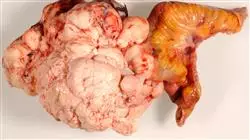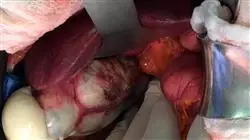University certificate
The world's largest faculty of medicine”
Introduction to the Program
Increase your skills: in this program you will learn to recognize rare types of breast cancer, the most specific aspects of its approach and the complexity of its treatment, with rigor and excellence"

The Postgraduate diploma in Uncommon Digestive, Gynecologic and Hereditary Tumors has been designed with the aim of preparing specialists in this field, with the most advanced and updated knowledge in the field.
Rare digestive tumors include a heterogeneous variety of pathologies with very different diagnostic, therapeutic and prognostic approach. According to the World Health Organization classification, the following tumors are included in this category: small bowel, appendicular, anal canal carcinoma, liver and intrahepatic bile duct tumors, gallbladder and extrahepatic bile duct neoplasms, and gastrointestinal stromal tumors.
Rare tumors of gynecologic origin often pose challenges for the specialist who only rarely deals with them, hence the need to train and stay familiar with the management of these pathologies. Urological neoplasms are themselves an uncommon group of tumors. These tumors may be rare because of their location, such as carcinoma of the penis, or because they show an atypical histology in the context of the location in which they arise, for example, neuroendocrine tumors of the prostate.
The common feature of all of them is that they are unknown and little studied, so there is not a great deal of documentation on the subject. In many cases, in the absence of clinical trials in these pathologies, due to the small number of patients, therapeutic management is usually based on the extrapolation of existing data for neoplasms of similar location and higher frequency.
This program will also provide an opportunity to study the major hereditary syndromes from a clinical and molecular perspective. At the present time, every oncologist must ask patients about their family history, and it is imperative that they have, at a minimum, a baseline knowledge of family groupings.
Students will be able to complete the program at their own pace, without being subject to fixed schedules or the travel involved in classroom teaching, so they can combine it with the rest of their daily obligations.
Get updated! Deepen your knowledge of rare gynecologic cancers"
This Postgraduate diploma in Uncommon Digestive, Gynecologic and Hereditary Tumors contains the most complete and up-to-date scientific program on the market. Its most notable features are:
- Case studies presented by experts in oncology
- The graphic, schematic, and practical contents with which they are created, provide scientific and practical information on the disciplines that are essential for professional development
- New developments in the treatment of uncommon digestive, gynecological and hereditary tumors
- Practical exercises where the self-assessment process can be carried out to improve learning
- Its special emphasis on innovative methodologies in the diagnosis and treatment of Uncommon Digestive, Gynecologic and Hereditary Tumors
- Theoretical lessons, questions to the expert, debate forums on controversial topics, and individual reflection assignments
- Content that is accessible from any fixed or portable device with an Internet connection
You will acquire skills in the molecular approach that allows you to carry out an effective treatment with targeted therapies, as in the case of GIST"
The teaching staff includes professionals from the Oncology sector, who bring their experience to this educational program, as well as renowned specialists from leading societies and prestigious universities.
The multimedia content, developed with the latest educational technology, will provide the professional with situated and contextual learning, i.e., a simulated environment that will provide immersive knowledge programmed to learn in real situations.
This program is designed around Problem-Based Learning, whereby the specialist must try to solve the different professional practice situations that arise throughout the program. For this purpose, the professional will be assisted by an innovative interactive video system created by renowned and experienced experts.
You will study in depth thyroid cancer and neuroendocrine tumors, getting to diagnose and treat this group of neoplasms successfully"

Get an in-depth understanding of rare hereditary syndromes from a clinical and molecular perspective thanks to this TECH program"
Why study at TECH?
TECH is the world’s largest online university. With an impressive catalog of more than 14,000 university programs available in 11 languages, it is positioned as a leader in employability, with a 99% job placement rate. In addition, it relies on an enormous faculty of more than 6,000 professors of the highest international renown.

Study at the world's largest online university and guarantee your professional success. The future starts at TECH”
The world’s best online university according to FORBES
The prestigious Forbes magazine, specialized in business and finance, has highlighted TECH as “the world's best online university” This is what they have recently stated in an article in their digital edition in which they echo the success story of this institution, “thanks to the academic offer it provides, the selection of its teaching staff, and an innovative learning method aimed at educating the professionals of the future”
A revolutionary study method, a cutting-edge faculty and a practical focus: the key to TECH's success.
The most complete study plans on the university scene
TECH offers the most complete study plans on the university scene, with syllabuses that cover fundamental concepts and, at the same time, the main scientific advances in their specific scientific areas. In addition, these programs are continuously being updated to guarantee students the academic vanguard and the most in-demand professional skills. In this way, the university's qualifications provide its graduates with a significant advantage to propel their careers to success.
TECH offers the most comprehensive and intensive study plans on the current university scene.
A world-class teaching staff
TECH's teaching staff is made up of more than 6,000 professors with the highest international recognition. Professors, researchers and top executives of multinational companies, including Isaiah Covington, performance coach of the Boston Celtics; Magda Romanska, principal investigator at Harvard MetaLAB; Ignacio Wistumba, chairman of the department of translational molecular pathology at MD Anderson Cancer Center; and D.W. Pine, creative director of TIME magazine, among others.
Internationally renowned experts, specialized in different branches of Health, Technology, Communication and Business, form part of the TECH faculty.
A unique learning method
TECH is the first university to use Relearning in all its programs. It is the best online learning methodology, accredited with international teaching quality certifications, provided by prestigious educational agencies. In addition, this disruptive educational model is complemented with the “Case Method”, thereby setting up a unique online teaching strategy. Innovative teaching resources are also implemented, including detailed videos, infographics and interactive summaries.
TECH combines Relearning and the Case Method in all its university programs to guarantee excellent theoretical and practical learning, studying whenever and wherever you want.
The world's largest online university
TECH is the world’s largest online university. We are the largest educational institution, with the best and widest online educational catalog, one hundred percent online and covering the vast majority of areas of knowledge. We offer a large selection of our own degrees and accredited online undergraduate and postgraduate degrees. In total, more than 14,000 university degrees, in eleven different languages, make us the largest educational largest in the world.
TECH has the world's most extensive catalog of academic and official programs, available in more than 11 languages.
Google Premier Partner
The American technology giant has awarded TECH the Google Google Premier Partner badge. This award, which is only available to 3% of the world's companies, highlights the efficient, flexible and tailored experience that this university provides to students. The recognition as a Google Premier Partner not only accredits the maximum rigor, performance and investment in TECH's digital infrastructures, but also places this university as one of the world's leading technology companies.
Google has positioned TECH in the top 3% of the world's most important technology companies by awarding it its Google Premier Partner badge.
The official online university of the NBA
TECH is the official online university of the NBA. Thanks to our agreement with the biggest league in basketball, we offer our students exclusive university programs, as well as a wide variety of educational resources focused on the business of the league and other areas of the sports industry. Each program is made up of a uniquely designed syllabus and features exceptional guest hosts: professionals with a distinguished sports background who will offer their expertise on the most relevant topics.
TECH has been selected by the NBA, the world's top basketball league, as its official online university.
The top-rated university by its students
Students have positioned TECH as the world's top-rated university on the main review websites, with a highest rating of 4.9 out of 5, obtained from more than 1,000 reviews. These results consolidate TECH as the benchmark university institution at an international level, reflecting the excellence and positive impact of its educational model.” reflecting the excellence and positive impact of its educational model.”
TECH is the world’s top-rated university by its students.
Leaders in employability
TECH has managed to become the leading university in employability. 99% of its students obtain jobs in the academic field they have studied, within one year of completing any of the university's programs. A similar number achieve immediate career enhancement. All this thanks to a study methodology that bases its effectiveness on the acquisition of practical skills, which are absolutely necessary for professional development.
99% of TECH graduates find a job within a year of completing their studies.
Postgraduate Diploma in Digestive, Gynecologic and Hereditary Infrequent Tumors
Training in the area of Infrequent Tumors is a necessity nowadays, since these types of pathologies are little known and studied, which makes their diagnosis and treatment difficult. In addition, many specialists only face these cases on a few occasions, so it is essential to be updated in the latest techniques and therapeutic approaches. With this Postgraduate Diploma, you will have access to the most advanced and updated scientific postulates in the field, as well as the possibility of deepening in the therapeutic management of these rare pathologies. These include rare digestive tumors, gynecological tumors and urological neoplasms, in addition to the major hereditary syndromes.
You will be trained with the most advanced educational methodology.
With a clinical and molecular approach, this Postgraduate Diploma in Infrequent Digestive, Gynecological and Hereditary Tumors will address in depth the therapeutic management of these pathologies, as well as the interpretation of the family history of patients. In addition, you will have the opportunity to complete the program at your own pace, without being subject to fixed schedules or travel, thanks to its 100% online format, with which you will be able to access all the contents from anywhere, anytime.







